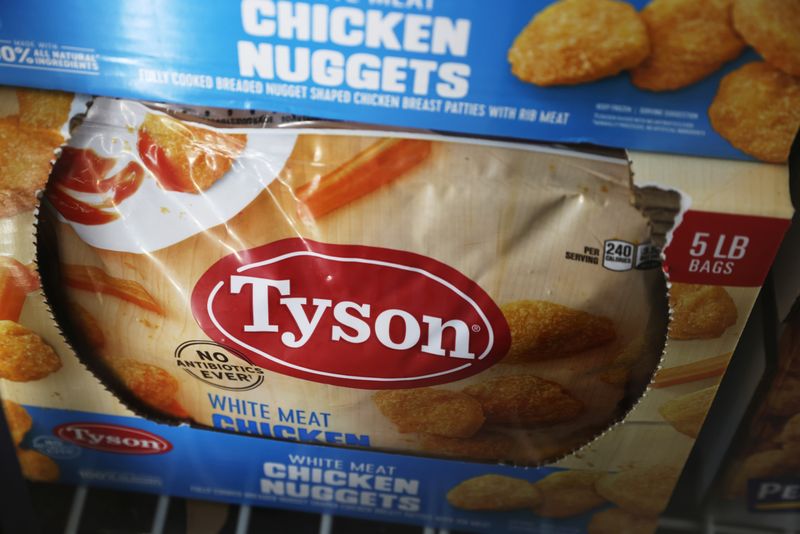By Tom Polansek and Deborah Mary Sophia
(Reuters) -Tyson Foods Inc took a "hit in the mouth" as larger-than-expected beef and pork supplies weakened demand for its chicken, executives said on Monday as the meatpacker missed Wall Street estimates for quarterly profit.
The company's primary markets - beef, pork and chicken - went the opposite direction from what executives had planned and they were left surprised by how much meat was available in the United States. Shares of Tyson, the largest U.S. meat company by sales, were down 4.8% at $60.97 on Monday afternoon.
The results show Tyson's struggle to forecast demand for meat in a high-inflation environment and as the availability of beef changes rapidly while drought in the western United States drives ranchers to reduce cattle herds by sending more animals to slaughter.
Tyson also grappled with larger-than-expected supplies of chicken as the worst-ever U.S. outbreak of bird flu triggered export restrictions, resulting in more poultry available domestically, the company said.
"We got hit in the mouth in Q1 because of all the protein on the market," Chief Executive Officer Donnie King told analysts on a call.
Tyson began planning in August to meet strong demand for chicken at supermarkets in November and December, King said. Meatpacking executives thought chicken would need to fill an expected gap in overall meat supplies caused by reduced beef and pork production, he said.
Their forecasts were wrong, though. Beef production was surprisingly high, leaving Tyson to resell excess chicken at a discount and spend money moving it, King said.
In January, Tyson said Wes Morris would replace David Bray as president of its poultry business.
The company can do a better job making sure it has the appropriate number of chickens in the right place at the right time, Morris said on the call. Tyson can also improve its understanding of shifting consumer demand, he said.
The second quarter will likely be weaker than the first, which ended on Dec. 31, Chief Financial Officer John R. Tyson said. Tyson cut its outlooks for operating margins this year.
Consumers are exhibiting "unusual, erratic" behavior swapping between proteins, King said.
The impact of too much meat is a turnaround after Tyson said it struggled to get meat on store shelves during the COVID-19 pandemic and subsequent supply-chain problems.

Tyson's sales rose 2.5% to $13.26 billion in the first quarter, missing analysts' average estimate of $13.52 billion, according to Refinitiv IBES data. Adjusted earnings of 85 cents per share were much lower than expectations of $1.34 per share.
"This is the first time I've seen all markets work against us, all at the same time," King said.